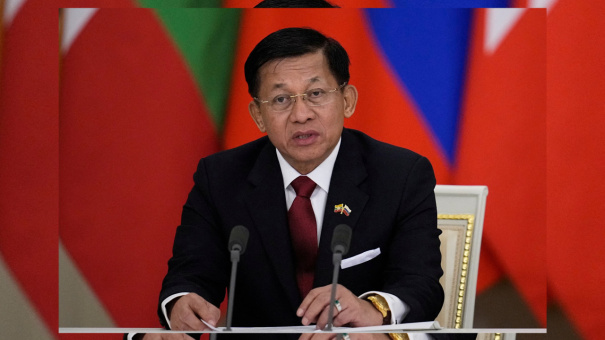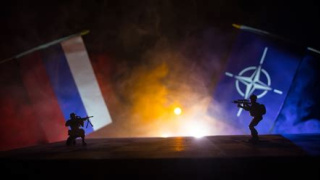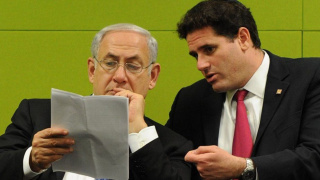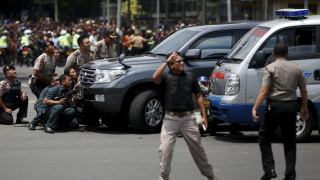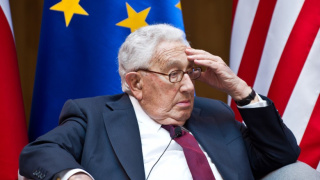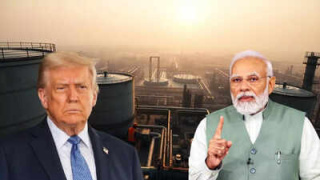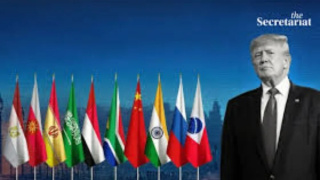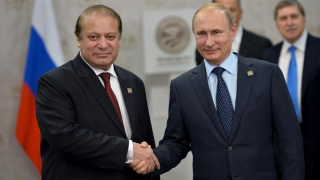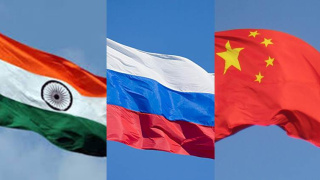Trump reverses US stand, begins engagement with Myanmar’s military government
Slowly but surely, the Myanmar government is getting its act together.
The military led-government’s plans to drive a transition to civilian rule is falling into place.
There are three-elements to the transition project. At the heart of this complex plan is the conduct of national elections that finds sufficient international support in the neighbourhood and beyond, including in Trump’s America. That effort appears to be gaining traction with the head of the State Administration Council (SAC), Senior General Ming Aung Hlaing announcing at a June international peace conference in Naypyidaw, the intent of the current administration to hold general elections by the end of the year or early 2026.
It is expected that the situation to conduct these polls will not be ideal. Insurgency haunts several provinces of Myanmar, making it difficult for people to cast their ballots in many areas.
Yet , there is hope that elections, though somewhat patchy, if held, will add to the legitimacy of the new government that will emerge following the polls.
The current administration is fully aware of the pitfalls. The proposed elections are being therefore billed as “transitional” elections–a big stepping stone to the full normalisation of the political situation in Myanmar, which went into free-fall following the 2020 elections.
In those elections, the National League for Democracy (NLD) was declared winner. But the military called these elections fraudulent. It claimed that over 10 million fraudulent ballots had been cast. As a result the polls did not represent the popular will.
The military leadership also asserted that voter turnout had been significantly reduced because of the Covid pandemic. The low turnout, because of the health emergency, had further eroded the legitimacy of the 2020 polls.
In fact, Myanmar’s Union Election Commission (UEC) during the course of the election campaign declared that voting would not be held in constituencies of the Rakhine, Kachin, Kayin, Mon and Shan States and the Bago Region, virtually disenfranchising hundreds of thousands.
It claimed that these areas did not meet the conditions required to hold free and fair elections. This move significantly undermined the representative character of the polls–a point that the military has rightfully highlighted.
The military, consequently declared the 2020 elections as illegitimate. In fact, it described its questionable results as a threat to national sovereignty. On February 1, 2021, the military invoked Articles 417 and 418 of the 2008 Constitution, declared a state of emergency and transferred power to Commander-in-Chief Min Aung Hlaing.
In the five years that followed the 2020 elections, the US deep state went into overdrive to back the National Unity Government (NUG)--a parallel setup comprising the out-of-business opposition groups—and shifted gears to accomplish regime change. It also funded armed insurgent groups, especially the People’s Defence Force (PDF), the armed wing of the NUG.
Marshalled by the Joe Biden administration, the Burma Unified through Rigorous Military Accountability Act or the BURMA Act became the legal instrument to drive regime change in Myanmar, on the usual pretext of supporting democracy and human rights.
Nested under the National Défense Authorization Act (NDAA), the BURMA Act included provisions for sanctioning Myanmar’s military government and providing humanitarian assistance and supporting “pro-democracy” groups such as the NUG, the self-styled Myanmar government in exile.
In implementing the BURMA Act, the U.S. Agency for International Development (USAID) played a crucial role. In fact, in 2024, the law allocated $121 million USD for fiscal year 2024, with USAID being responsible for channeling these funds to “empower” the anti-government civil society organizations and NGOs.
The National Endowment for Democracy (NED), on its part, provided grants to groups focused on human rights, opposition media apart from supporting “democratic governance”. Formed in 1981, by former US President Ronald Reagan, it is a government-funded but privately-run foundation to openly support "democratic movements abroad."
Unsurprisingly, the NED has collaborated with other “global democracy organizations”, advocating stronger sanctions and diplomatic pressure against Myanmar with the unstated objective of achieving regime change.
"The Burma Act is just one of many actions they’ve taken to bring suffering to our nation. This is something that does not benefit us. To be clear, the Burma Act is simply a way of supporting and assisting militants within Myanmar. It is not the kind of work that good friends should be doing. It’s like handing a knife to a thief," U Khaing Min, vice-chairman of the New National Democracy Party has been quoted as saying.
But with the arrival of Trump, the enforcement of the BURMA Act has virtually ground to a halt.
This has given the SAC its second wind, which it is now leveraging to ensure a smooth-as-possible political transition. In tune with the changes in the United States, the SAC in Myanmar has decided to directly engage with the Trump administration. That mission appears to have been accomplished.
Ironically, the opportunity to establish direct communication with the Trump administration arrived, when Washington decided to raise tariffs on Myanmar’s exports to the United States.
Therefore, when , in early July, Trump said he had lowered the "reciprocal" tariff rate on goods from Myanmar to 40% from the 44% announced in April, it gave Yangon an opening to engage with the US.
Consequently, Senior General Min Aung Hlaing wrote to Trump that his government was "truly grateful" for the tariff reduction. He praised Trump for "strong leadership" and "continued efforts to promote peace on the global stage."
But in the same letter, he called for a sharp reduction in US tariff rates on Myanmar products to range between 10% to 20% . In return, he promised Myanmar would peg tariff rates on American goods between zero and 10%.
Besides, in the July 11 missive, the Senior General asked Trump "to reconsider easing and lifting the economic sanctions imposed on Myanmar, as they hinder the shared interests and prosperity of both countries and their peoples."
Two weeks after the letter, the US has signalled that instead of isolating, it is prepared to engage with the Generals in Myanmar. The big breakthrough, which overturned the Biden administration’s obsession of arm twisting the Myanmar government, came when the US treasury department lifted sanctions on four key individuals that have reportedly been part of the SAC’s inner circle, apparently responding to the Senior General’s call. The US move has triggered hopes that Washington maybe inclined to legitimise the proposed election —a move that could have a major downstream impact on US allies.
The list comprises KT Services & Logistics and its founder, Jonathan Myo Kyaw Thaung; the MCM Group and its owner Aung Hlaing Oo; and Suntac Technologies and its owner Sit Taing Aung; and another individual, Tin Latt Min.
The KT group operates businesses ranging from logistics, real estate, aviation, energy, and telecommunications. It also controls a network of 28 subsidiaries across Myanmar and Singapore, apart from running a charitable arm called KT Care, which was founded in 2008.
Aung Hlaing Oo is the founder and CEO of Myanmar Chemical & Machinery Co. (MCM)-- a company that was founded in 2001, covering businesses such as steel, commodity trading, and defence manufacturing.
Suntac Group, founded by Sit Taing Aung operates a string of companies engaged in engineering, construction, mapping, and defence logistics. Sit Taing Aung has reportedly served as managing partner of Mottama Development Group, which has been engaged in real estate and defence-related ventures.
Finally, Tin Latt Min, is a businesswoman who co-owns or controls multiple companies including petroleum, logistics, and manufacturing industry with her husband, Thein Win Zaw.
Third, in order to grease a challenging political transition that has included a drive to forge a rapprochement with Washington, Myanmar’s SAC has stepped up its neighbourhood first drive along with deepening its ties with the emerging economies ahead of the upcoming elections.
For instance, on May 29, Myanma Oil and Gas Enterprise (MOGE) and Thailand's Gulf Petroleum, signed a new natural gas development contract–the first after the change of guard in Yangon.
The offshore Min Ye Thu project in Myanmar’s neighbourhood, is expected to result in gas extraction by 2028. Thailand's energy group PTT had also, earlier in April, reached a basic agreement with MOGE in April to step up production at a separate offshore gas field.
This has been widely welcomed by Myanmar authorities , who have been seeking energy deals with Thailand after key multinationals including Chevron and Malaysia's Petronas deserted Myanmar’s critical energy sector after 2021.
But Thailand had decided to go ahead with the deal, in order to secure gas, to fulfill its growing domestic energy demand in the future.
Similar to Thailand, which shares a border with Myanmar, China too is showing greater interest in procuring gas from its neighbour.
The state-owned China National Petroleum Corp. is reportedly discussing with the military government on a new liquefied natural gas venture on Myanmar’s west coast. The Chinese government would focus on infrastructure development and security for the project.
Simultaneously, Myanmar's military has been reaching out to Russia, in its bid to acquire heavyweight friends. Significantly, Myanmar and Russian authorities signed an investment agreement in June.
This includes a nuclear power generation plan, involving Rosatom–Russia's state-run crown jewel.
In its bid to break out of its isolation, Myanmar is building strong ties with neighbouring India. Myanmar is key to India-led Asian trilateral highway that will connect northeast India with the ASEAN and the Pacific Ocean via Myanmar and Thailand.
India has also developed Myanmar’s Sittwe port as an outlet to the sea for its landlocked northeast region.
Once a part of British India, India and Myanmar share deep historical and geo-cultural ties established thousands of years ago.
Unsurprisingly, Senior General Min Aung Hlaing has reached out to Prime Minister Narendra Modi . At the meeting on the sidelines of a summit of the Bay of Bengal countries in April, Modi spoke about India being a first responder to the recent earthquake in Myanmar. Significantly, instead of finding loopholes–a practice that is pervasive in the West, especially Europe–Modi backed the conduct of the credible and inclusive polls in Myanmar. He also offered Indian support in areas such as connectivity, capacity-building, and infrastructure development.
While they diversify their foreign engagements, it is important that Myanmar’s leaders do not allow their strategically sensitive nation to become a battleground for Sino-US rivalry.
Regarding its external partnership, Myanmar can become part of a 3+1 initiative with the Russia-India-China (RIC) subgroup coordinating its engagement with Yangon, to prevent the nation from becoming a territory where geopolitical rivalries flare.
